
MiniAI-Face-Recognition-LivenessDetection-AndroidSDK
NIST FRVT Top Ranked Face Recognition, iBeta 2 Certified Liveness Detection Engine (3D Face Anti-Spoofing) on Mobile
Stars: 307
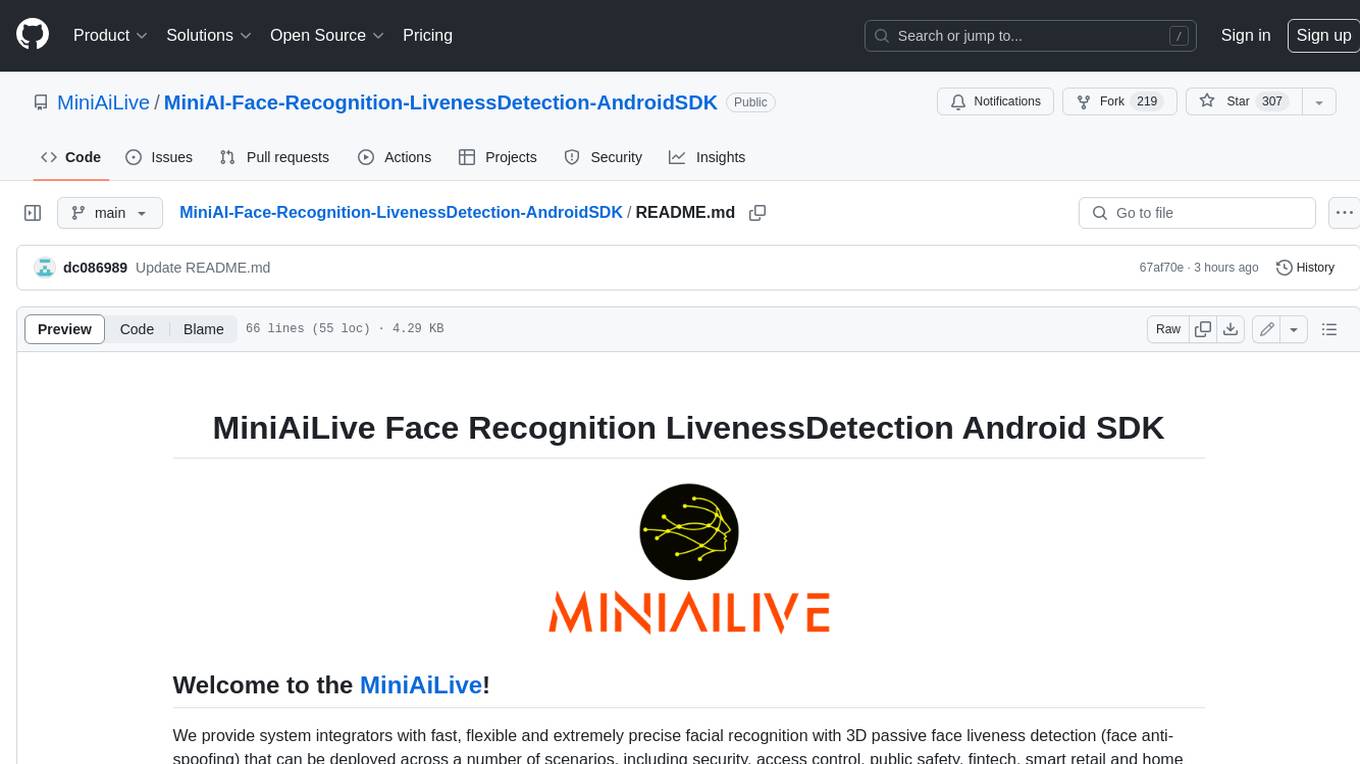
MiniAiLive provides system integrators with fast, flexible and extremely precise facial recognition with 3D passive face liveness detection (face anti-spoofing) that can be deployed across a number of scenarios, including security, access control, public safety, fintech, smart retail and home protection.
README:
Welcome to the MiniAiLive!
We provide system integrators with fast, flexible and extremely precise facial recognition with 3D passive face liveness detection (face anti-spoofing) that can be deployed across a number of scenarios, including security, access control, public safety, fintech, smart retail and home protection. Feel free to use our MiniAI Face Recognition Android SDK.
Note
SDK is fully on-premise, processing all happens on hosting server and no data leaves server.

Feel free to Contact US to get a trial License.
Contributions are welcome! If you'd like to contribute to this project, please follow these steps:
1. Fork the repository.
2. Create a new branch for your feature or bug fix.
3. Make your changes and commit them with descriptive messages.
4. Push your changes to your forked repository.
5. Submit a pull request to the original repository.Please visit our Face API Web Demo here. https://demo.miniai.live
| No | Project | Feature |
|---|---|---|
| 1 | MiniAI-Face-Recognition-LivenessDetection-AndroidSDK | Face Matching, 3D Face Passive Liveness |
| 2 | MiniAI-Face-Recognition-LivenessDetection-iOS-SDK | Face Matching, 3D Face Passive Liveness |
| 3 | MiniAI-Face-Recognition-LivenessDetection-ServerSDK | Face Matching, 3D Face Passive Liveness |
| 4 | MiniAI-Face-Recognition-LivenessDetection-WindowsSDK | Face Matching, 3D Face Passive Liveness |
| 5 | MiniAI-Face-LivenessDetection-AndroidSDK | 3D Face Passive Liveness |
| 6 | MiniAI-Face-LivenessDetection-iOS-SDK | 3D Face Passive Liveness |
| 7 | MiniAI-Face-LivenessDetection-ServerSDK | 3D Face Passive Liveness |
| 8 | MiniAI-Face-Matching-AndroidSDK | 1:1 Face Matching |
| 9 | MiniAI-Face-Matching-iOS-SDK | 1:1 Face Matching |
| 10 | MiniAI-Face-Attributes-AndroidSDK | Face Attributes |
MiniAiLive is a leading AI solutions company specializing in computer vision and machine learning technologies. We provide cutting-edge solutions for various industries, leveraging the power of AI to drive innovation and efficiency.
For any inquiries or questions, please Contact US
For Tasks:
Click tags to check more tools for each tasksFor Jobs:
Alternative AI tools for MiniAI-Face-Recognition-LivenessDetection-AndroidSDK
Similar Open Source Tools

MiniAI-Face-Recognition-LivenessDetection-AndroidSDK
MiniAiLive provides system integrators with fast, flexible and extremely precise facial recognition with 3D passive face liveness detection (face anti-spoofing) that can be deployed across a number of scenarios, including security, access control, public safety, fintech, smart retail and home protection.

MiniAI-Face-LivenessDetection-AndroidSDK
The MiniAiLive Face Liveness Detection Android SDK provides advanced computer vision techniques to enhance security and accuracy on Android platforms. It offers 3D Passive Face Liveness Detection capabilities, ensuring that users are physically present and not using spoofing methods to access applications or services. The SDK is fully on-premise, with all processing happening on the hosting server, ensuring data privacy and security.
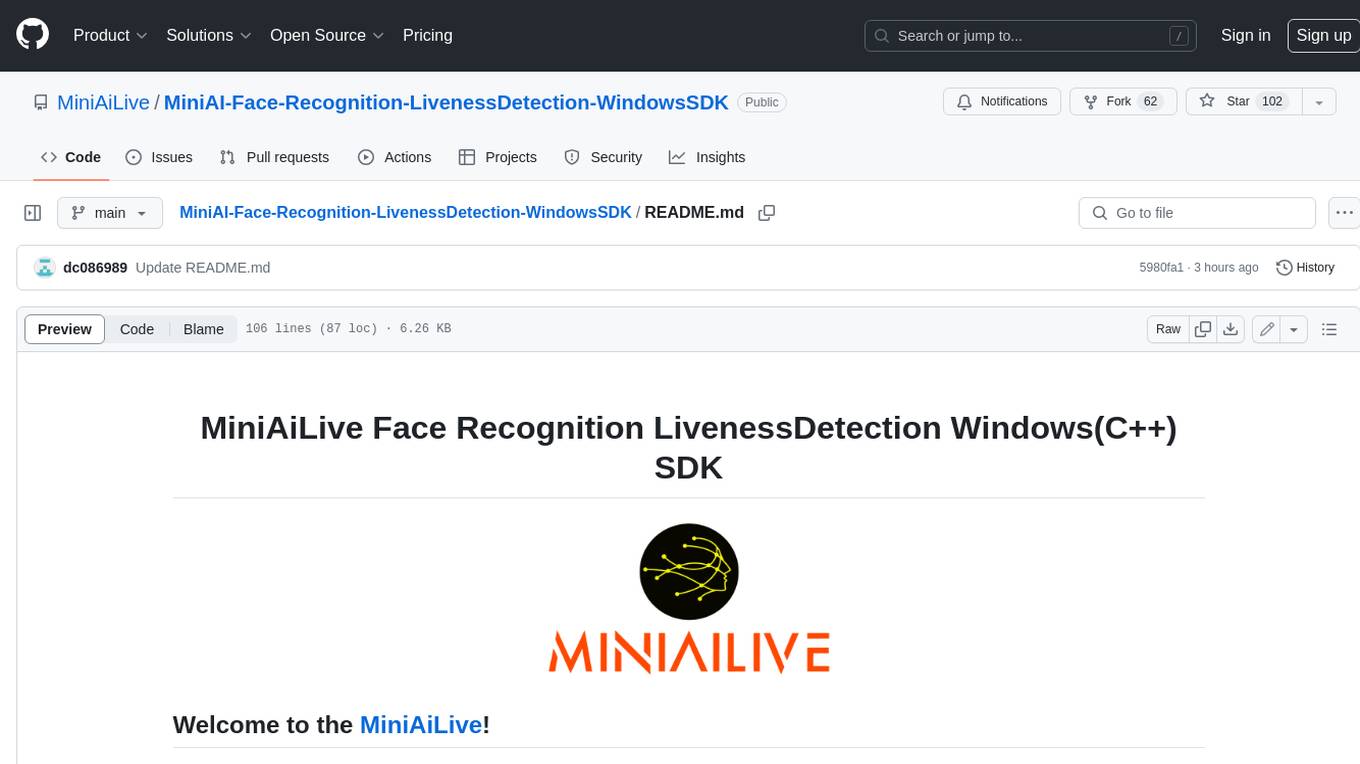
MiniAI-Face-Recognition-LivenessDetection-WindowsSDK
This repository contains a C++ application that demonstrates face recognition capabilities using computer vision techniques. The demo utilizes OpenCV and dlib libraries for efficient face detection and recognition with 3D passive face liveness detection (face anti-spoofing). Key Features: Face detection: The SDK utilizes advanced computer vision techniques to detect faces in images or video frames, enabling a wide range of applications. Face recognition: It can recognize known faces by comparing them with a pre-defined database of individuals. Age estimation: It can estimate the age of detected faces. Gender detection: It can determine the gender of detected faces. Liveness detection: It can detect whether a face is from a live person or a static image.
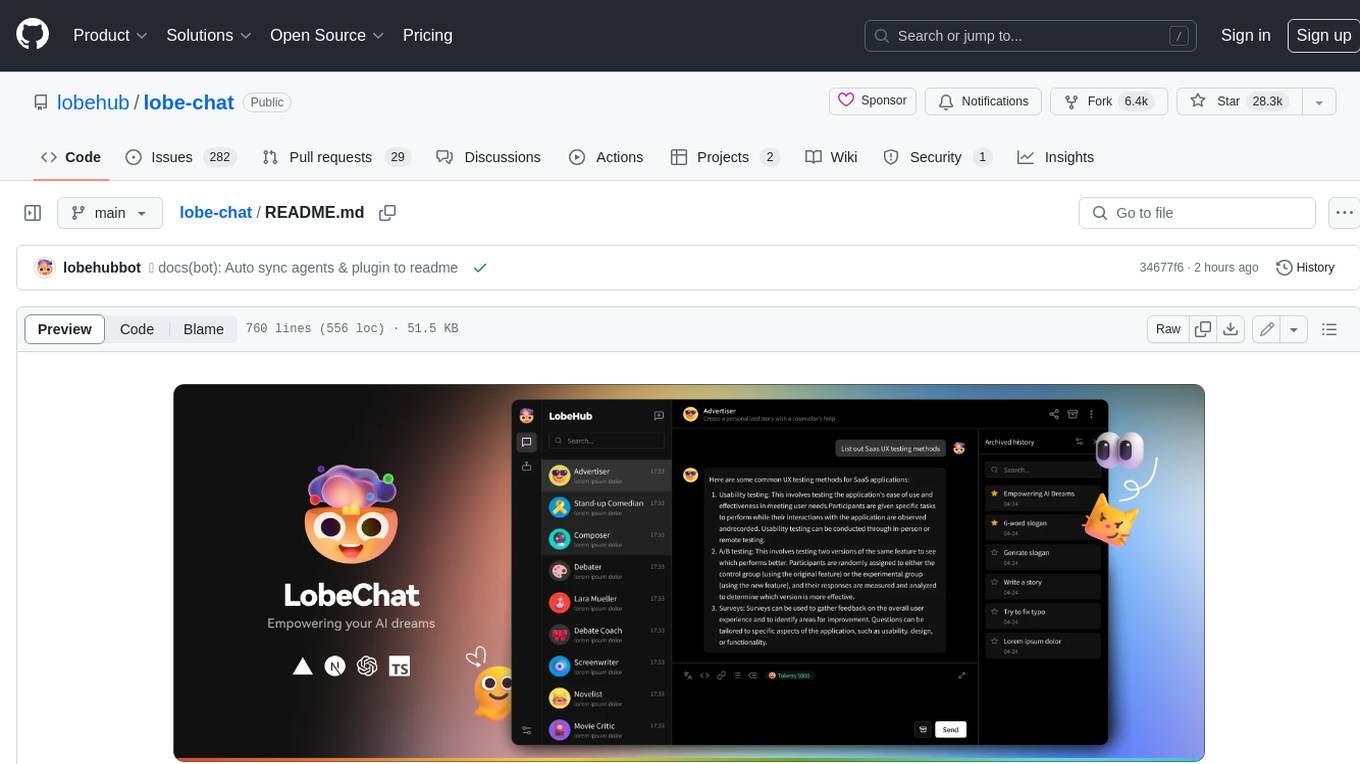
lobe-chat
Lobe Chat is an open-source, modern-design ChatGPT/LLMs UI/Framework. Supports speech-synthesis, multi-modal, and extensible ([function call][docs-functionc-call]) plugin system. One-click **FREE** deployment of your private OpenAI ChatGPT/Claude/Gemini/Groq/Ollama chat application.
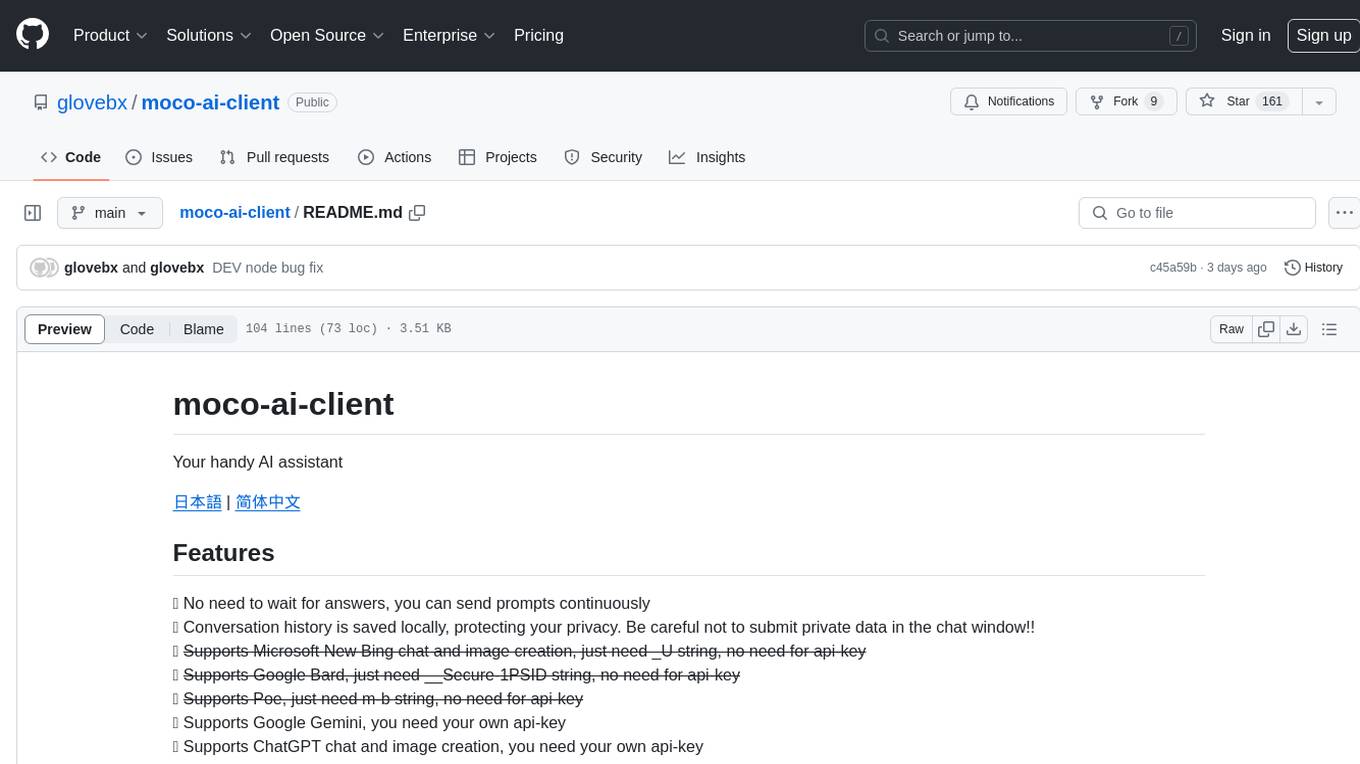
moco-ai-client
The moco-ai-client is an AI assistant tool that allows users to send prompts continuously without waiting for answers. It saves conversation history locally to protect privacy. The tool supports various AI services like Google Gemini, ChatGPT, and GPT3.5. It also enables voice input in Chinese and English, text-to-speech in multiple languages, and image generation. Users can customize roles and share content easily. The tool is under development, and suggestions are welcome for improvements.
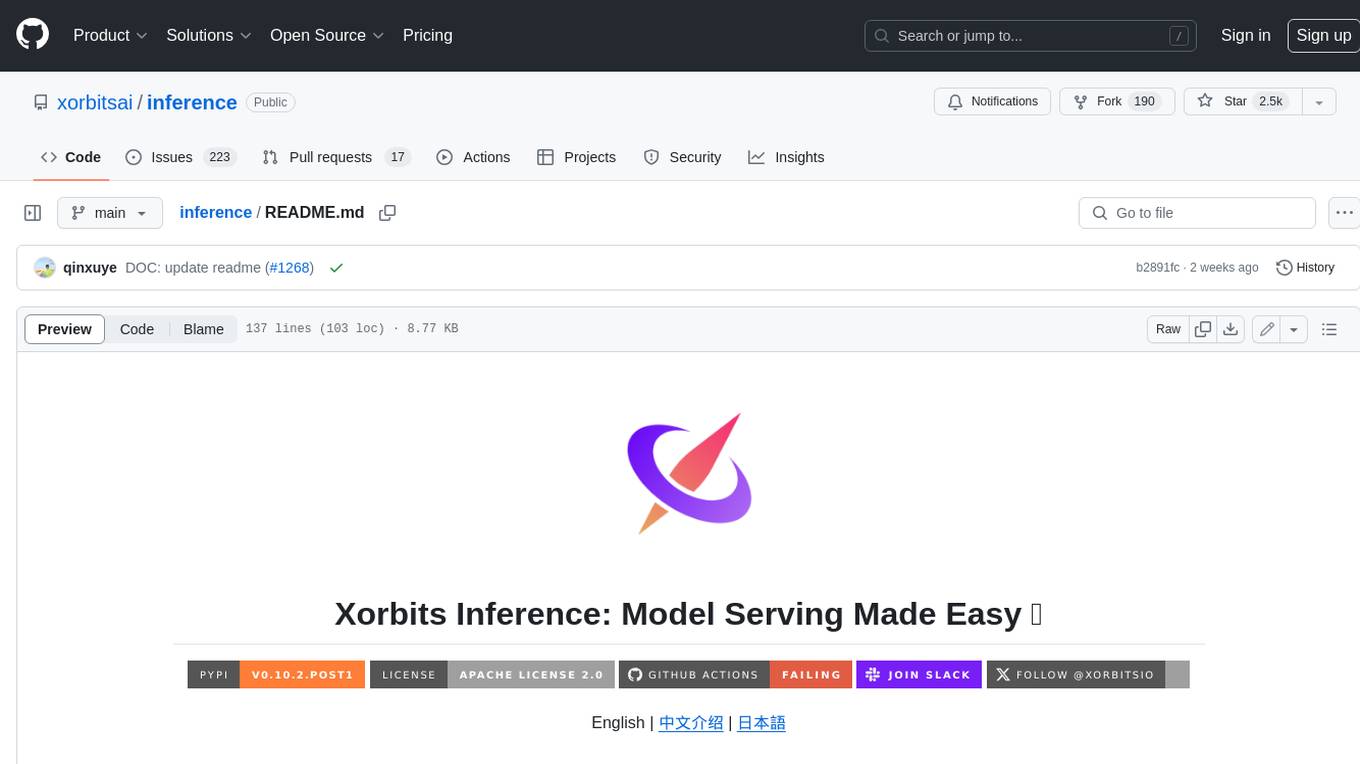
inference
Xorbits Inference (Xinference) is a powerful and versatile library designed to serve language, speech recognition, and multimodal models. With Xorbits Inference, you can effortlessly deploy and serve your or state-of-the-art built-in models using just a single command. Whether you are a researcher, developer, or data scientist, Xorbits Inference empowers you to unleash the full potential of cutting-edge AI models.
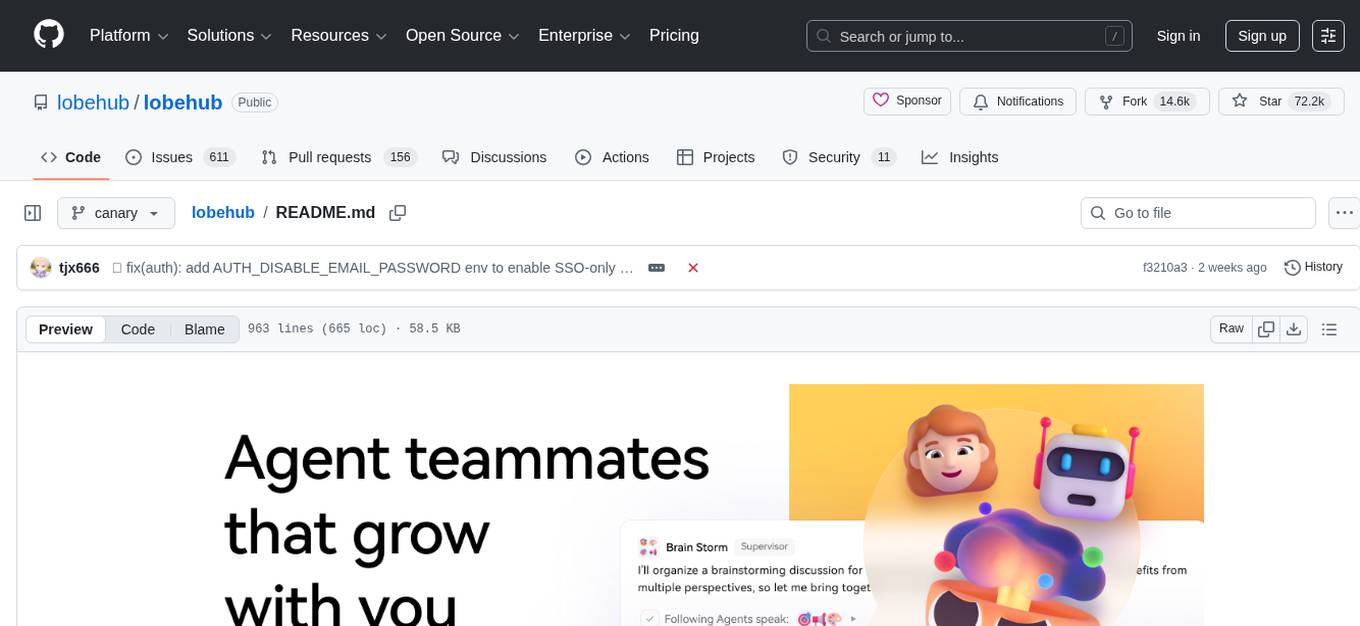
lobehub
LobeHub is the ultimate space for work and life, where users can find, build, and collaborate with agent teammates that grow with them. It aims to create the world's largest human-agent co-evolving network. LobeHub treats agents as the unit of work, providing an infrastructure for humans and agents to co-evolve. Users can create personalized AI teams, collaborate with agent groups, and experience the co-evolution of humans and agents. The platform supports various features like model visual recognition, TTS & STT voice conversation, text to image generation, plugin system for function calling, and an agent market for GPTs. LobeHub also offers self-hosting options with Vercel, Alibaba Cloud, and Docker Image, along with an ecosystem of UI components, icons, TTS libraries, and lint configurations.
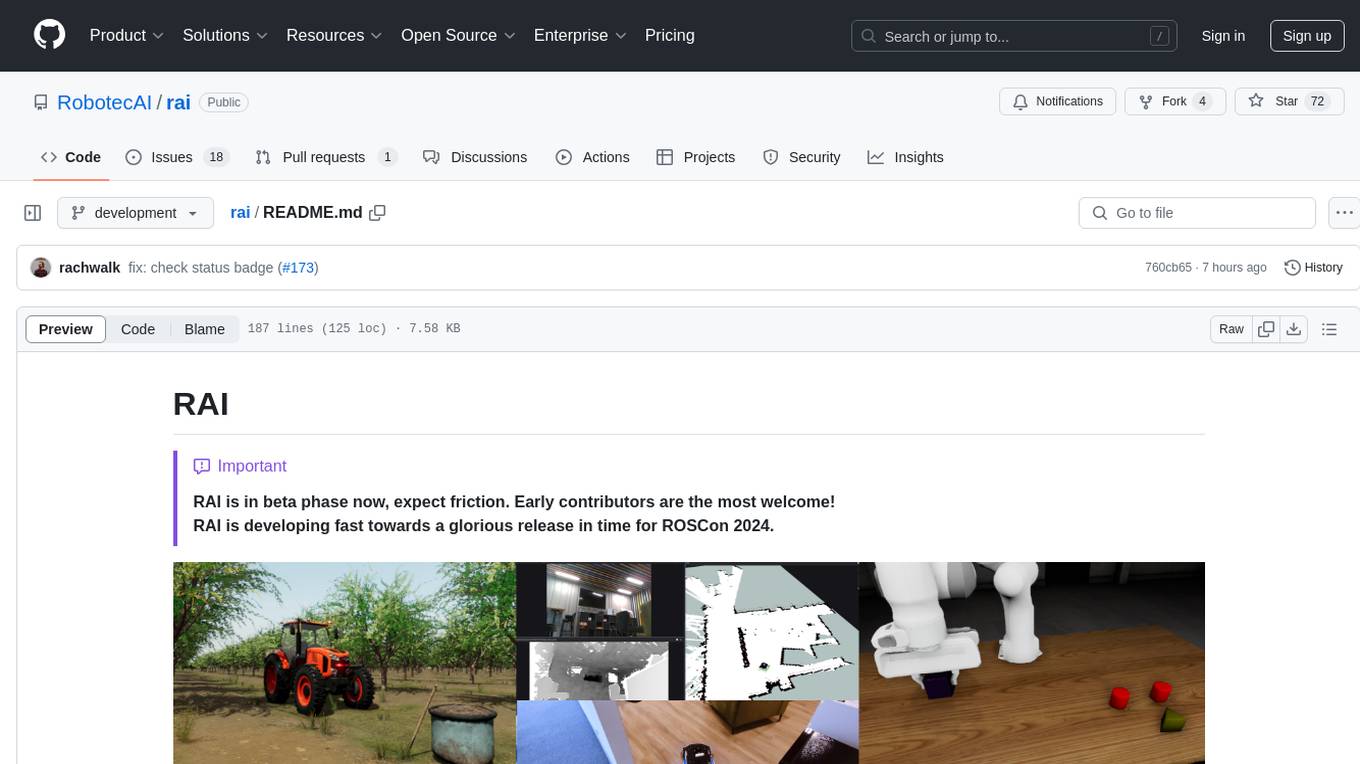
rai
RAI is a framework designed to bring general multi-agent system capabilities to robots, enhancing human interactivity, flexibility in problem-solving, and out-of-the-box AI features. It supports multi-modalities, incorporates an advanced database for agent memory, provides ROS 2-oriented tooling, and offers a comprehensive task/mission orchestrator. The framework includes features such as voice interaction, customizable robot identity, camera sensor access, reasoning through ROS logs, and integration with LangChain for AI tools. RAI aims to support various AI vendors, improve human-robot interaction, provide an SDK for developers, and offer a user interface for configuration.
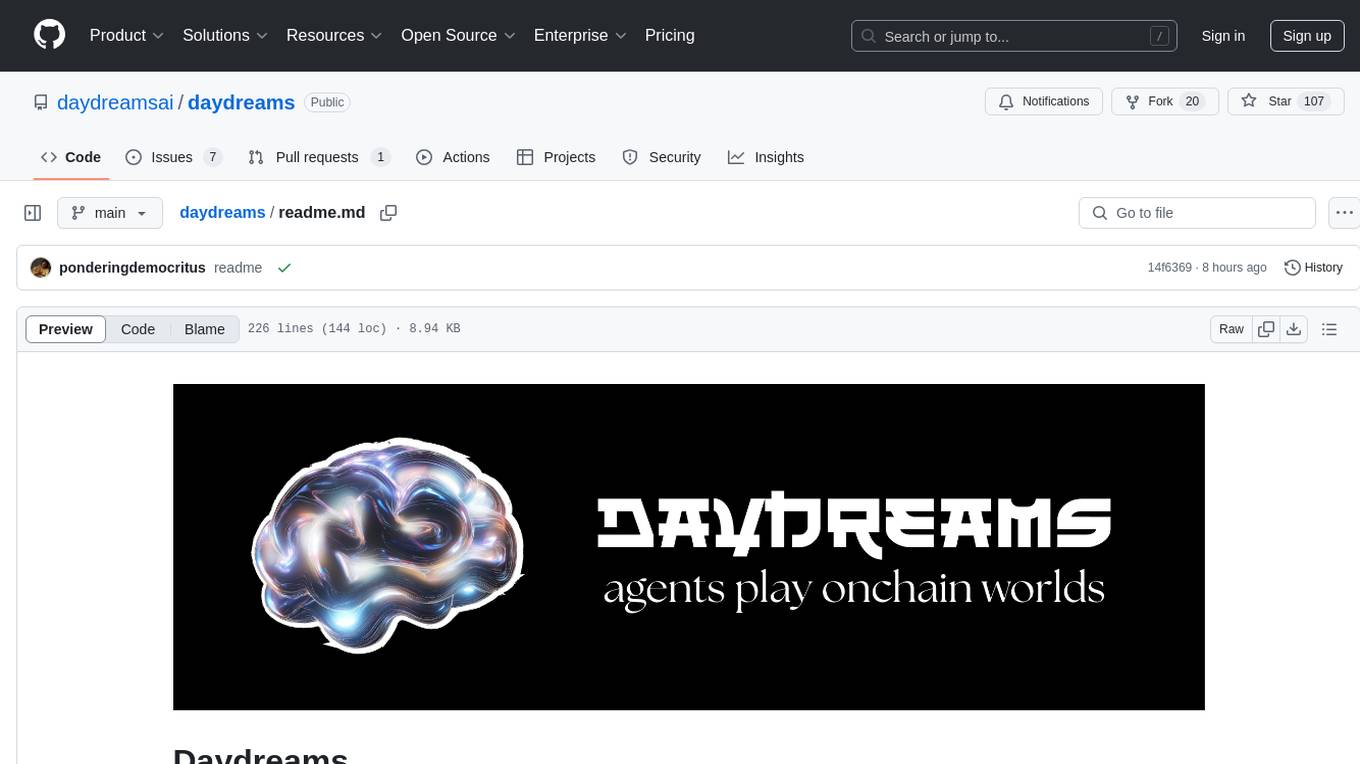
daydreams
Daydreams is a generative agent library designed for playing onchain games by injecting context. It is chain agnostic and allows users to perform onchain tasks, including playing any onchain game. The tool is lightweight and powerful, enabling users to define game context, register actions, set goals, monitor progress, and integrate with external agents. Daydreams aims to be 'lite' and 'composable', dynamically generating code needed to play games. It is currently in pre-alpha stage, seeking feedback and collaboration for further development.
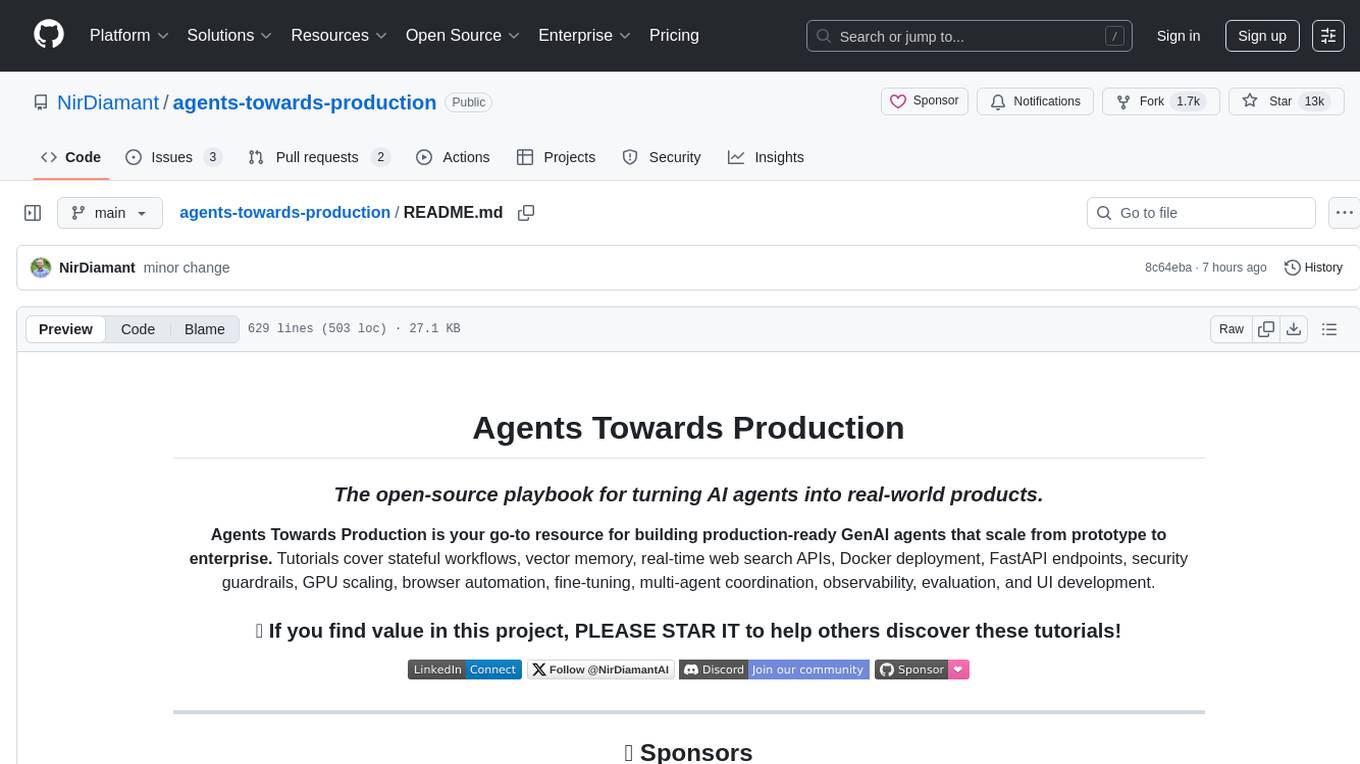
agents-towards-production
Agents Towards Production is an open-source playbook for building production-ready GenAI agents that scale from prototype to enterprise. Tutorials cover stateful workflows, vector memory, real-time web search APIs, Docker deployment, FastAPI endpoints, security guardrails, GPU scaling, browser automation, fine-tuning, multi-agent coordination, observability, evaluation, and UI development.
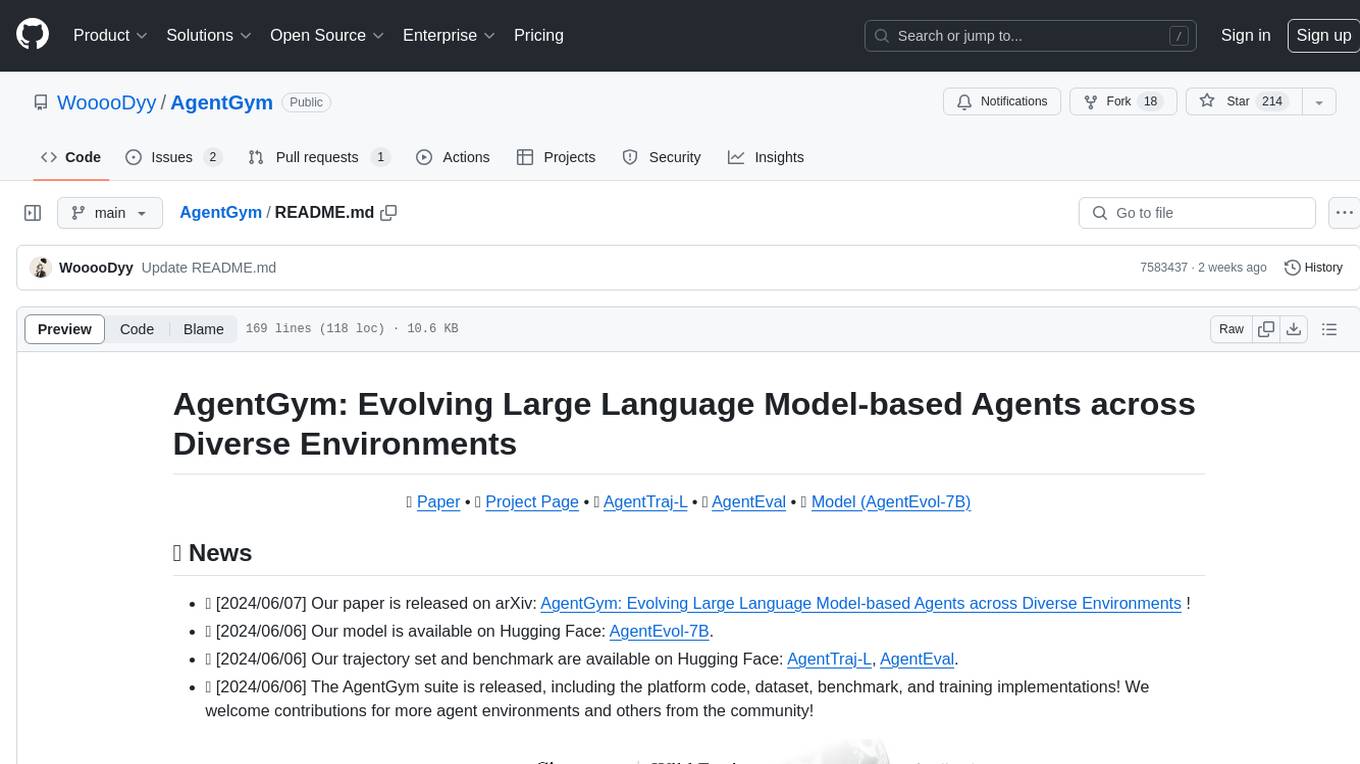
AgentGym
AgentGym is a framework designed to help the AI community evaluate and develop generally-capable Large Language Model-based agents. It features diverse interactive environments and tasks with real-time feedback and concurrency. The platform supports 14 environments across various domains like web navigating, text games, house-holding tasks, digital games, and more. AgentGym includes a trajectory set (AgentTraj) and a benchmark suite (AgentEval) to facilitate agent exploration and evaluation. The framework allows for agent self-evolution beyond existing data, showcasing comparable results to state-of-the-art models.
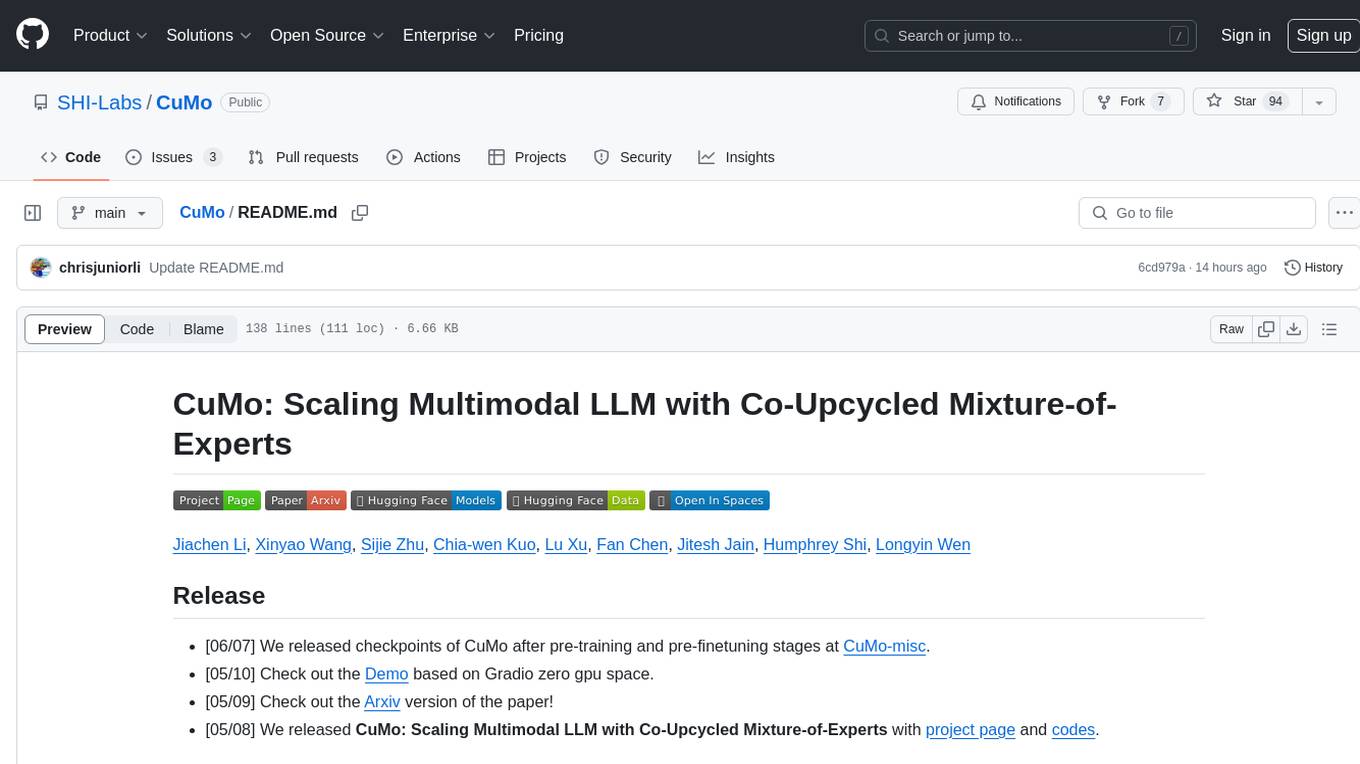
CuMo
CuMo is a project focused on scaling multimodal Large Language Models (LLMs) with Co-Upcycled Mixture-of-Experts. It introduces CuMo, which incorporates Co-upcycled Top-K sparsely-gated Mixture-of-experts blocks into the vision encoder and the MLP connector, enhancing the capabilities of multimodal LLMs. The project adopts a three-stage training approach with auxiliary losses to stabilize the training process and maintain a balanced loading of experts. CuMo achieves comparable performance to other state-of-the-art multimodal LLMs on various Visual Question Answering (VQA) and visual-instruction-following benchmarks.
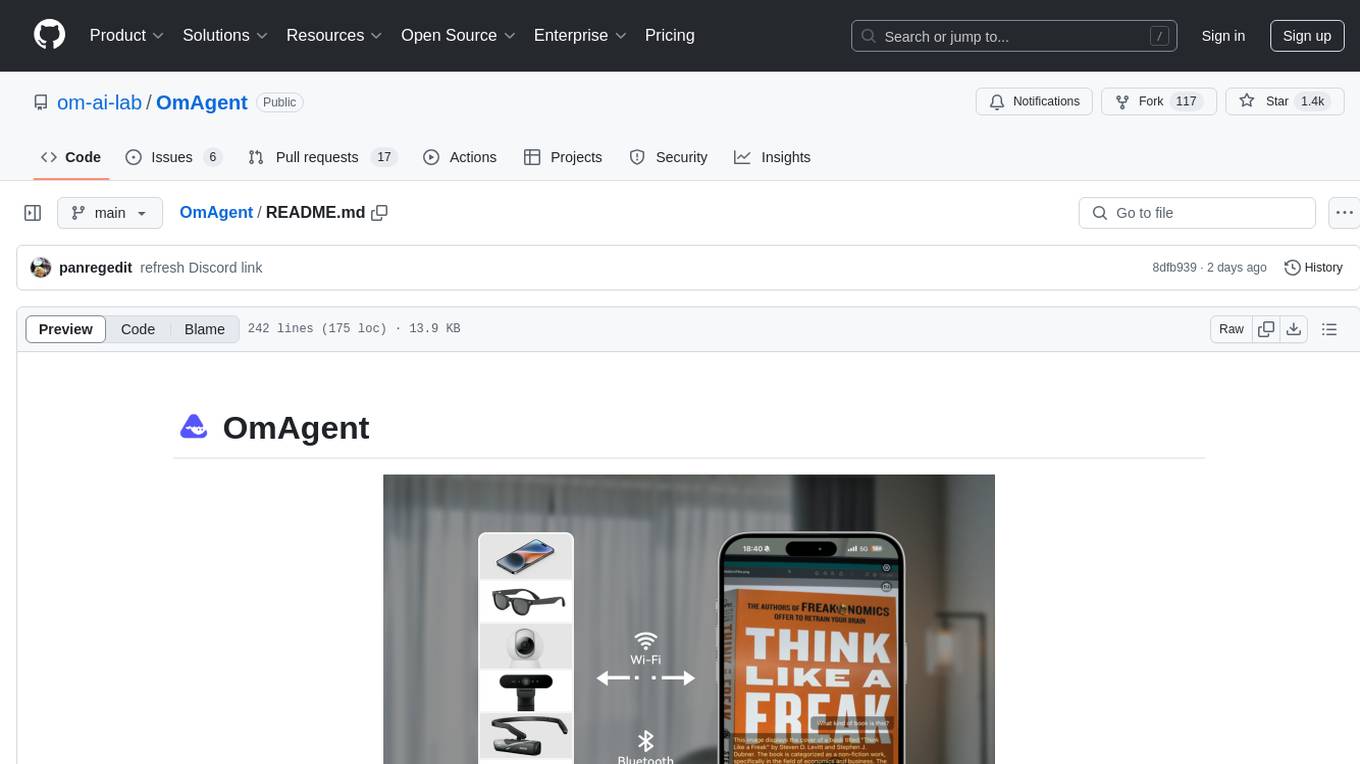
OmAgent
OmAgent is an open-source agent framework designed to streamline the development of on-device multimodal agents. It enables agents to empower various hardware devices, integrates speed-optimized SOTA multimodal models, provides SOTA multimodal agent algorithms, and focuses on optimizing the end-to-end computing pipeline for real-time user interaction experience. Key features include easy connection to diverse devices, scalability, flexibility, and workflow orchestration. The architecture emphasizes graph-based workflow orchestration, native multimodality, and device-centricity, allowing developers to create bespoke intelligent agent programs.
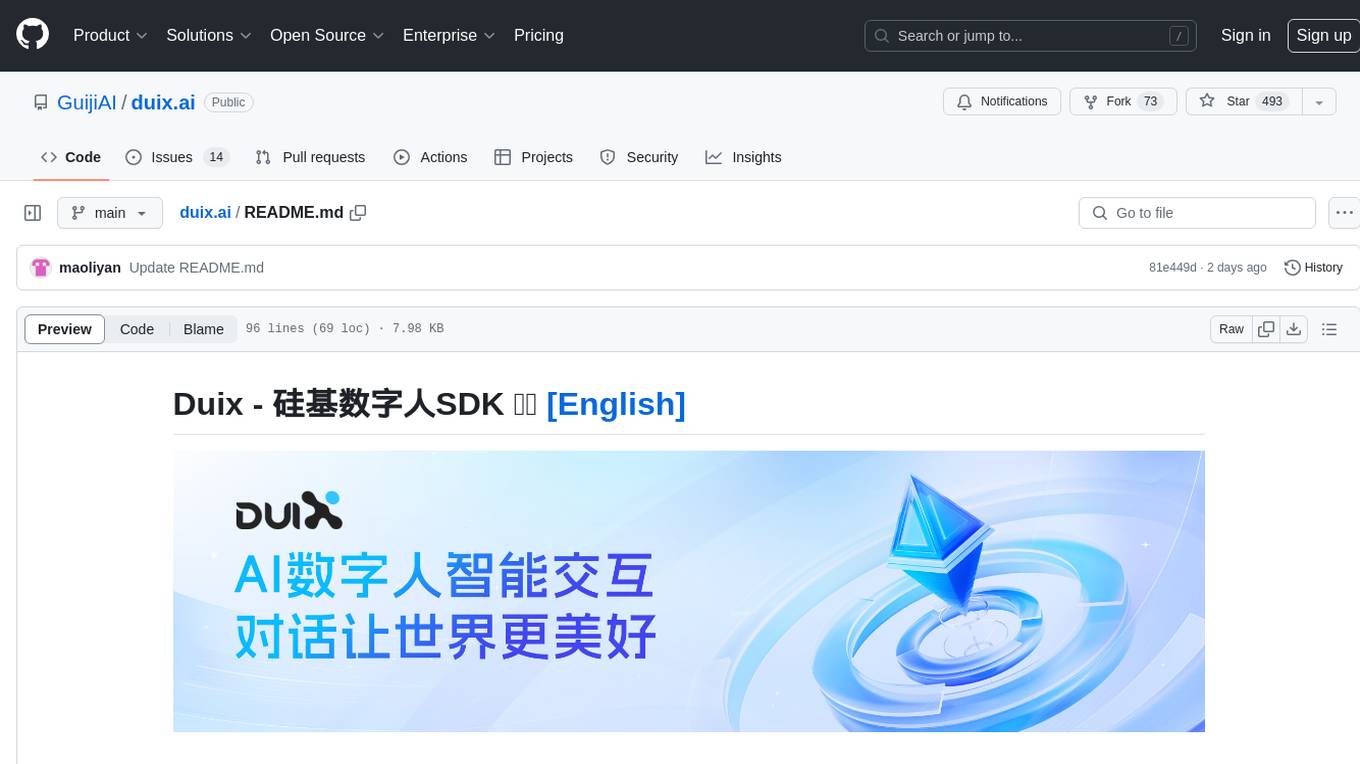
duix.ai
Duix is a silicon-based digital human SDK for intelligent interaction, providing users with instant virtual human interaction experience on devices like Android and iOS. The SDK offers intuitive effect display and supports user customization through open documentation. It is fully open-source, allowing developers to understand its workings, optimize, and innovate further.

second-brain-ai-assistant-course
This open-source course teaches how to build an advanced RAG and LLM system using LLMOps and ML systems best practices. It helps you create an AI assistant that leverages your personal knowledge base to answer questions, summarize documents, and provide insights. The course covers topics such as LLM system architecture, pipeline orchestration, large-scale web crawling, model fine-tuning, and advanced RAG features. It is suitable for ML/AI engineers and data/software engineers & data scientists looking to level up to production AI systems. The course is free, with minimal costs for tools like OpenAI's API and Hugging Face's Dedicated Endpoints. Participants will build two separate Python applications for offline ML pipelines and online inference pipeline.
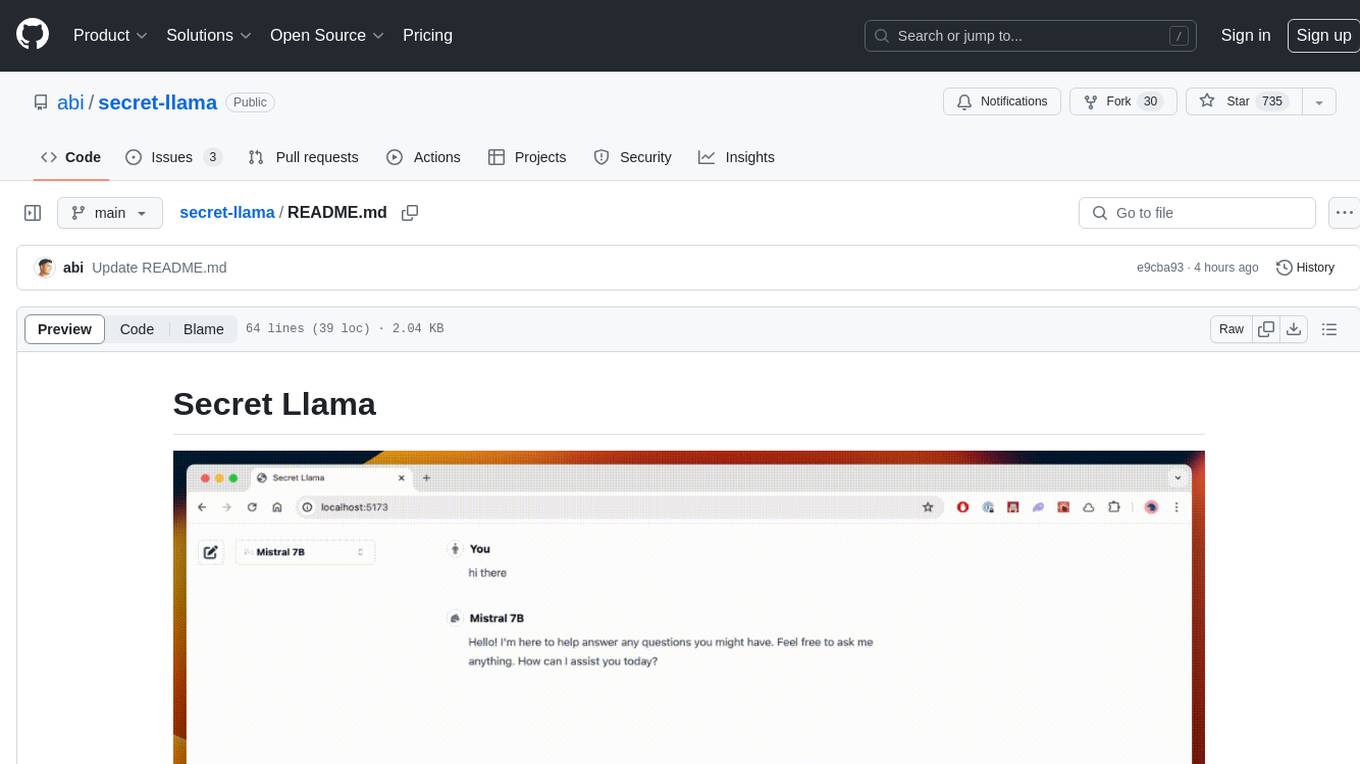
secret-llama
Entirely-in-browser, fully private LLM chatbot supporting Llama 3, Mistral and other open source models. Fully private = No conversation data ever leaves your computer. Runs in the browser = No server needed and no install needed! Works offline. Easy-to-use interface on par with ChatGPT, but for open source LLMs. System requirements include a modern browser with WebGPU support. Supported models include TinyLlama-1.1B-Chat-v0.4-q4f32_1-1k, Llama-3-8B-Instruct-q4f16_1, Phi1.5-q4f16_1-1k, and Mistral-7B-Instruct-v0.2-q4f16_1. Looking for contributors to improve the interface, support more models, speed up initial model loading time, and fix bugs.
For similar tasks

MiniAI-Face-Recognition-LivenessDetection-AndroidSDK
MiniAiLive provides system integrators with fast, flexible and extremely precise facial recognition with 3D passive face liveness detection (face anti-spoofing) that can be deployed across a number of scenarios, including security, access control, public safety, fintech, smart retail and home protection.
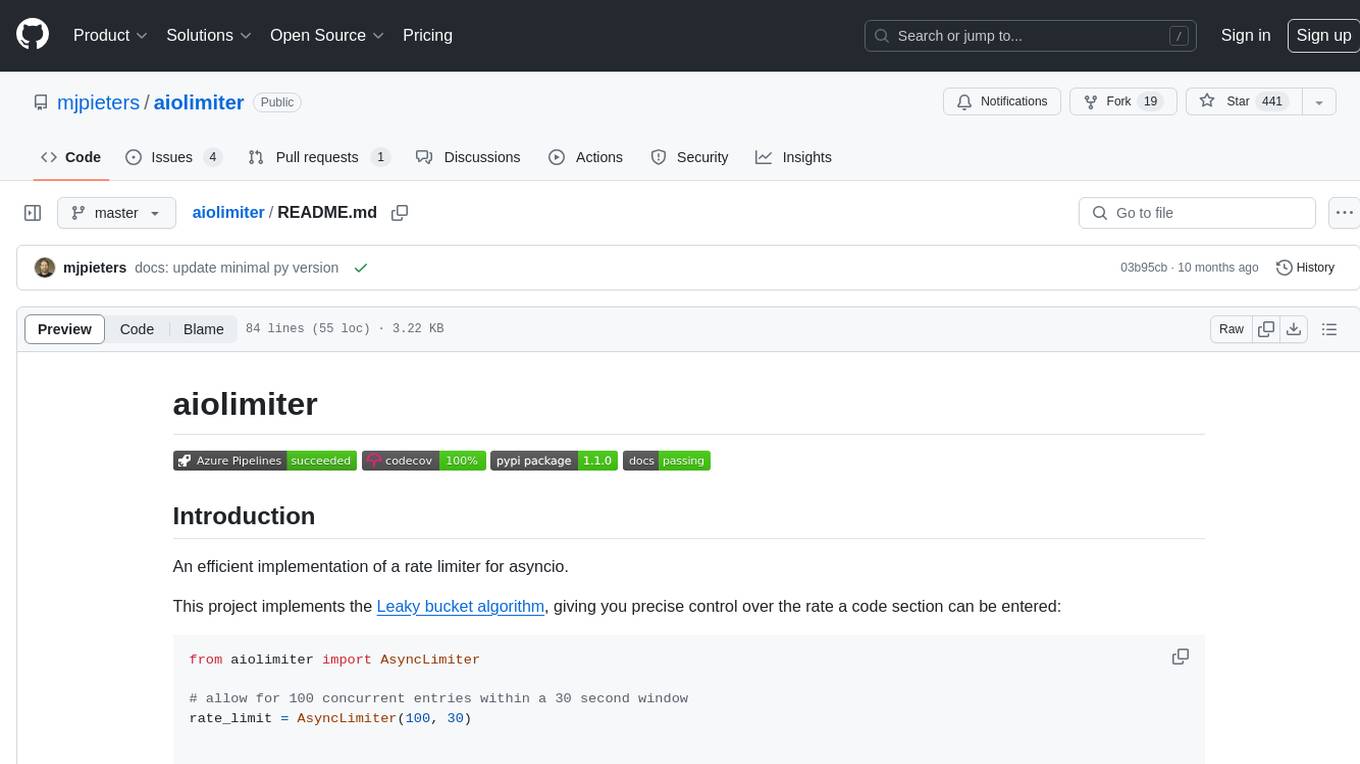
aiolimiter
An efficient implementation of a rate limiter for asyncio using the Leaky bucket algorithm, providing precise control over the rate a code section can be entered. It allows for limiting the number of concurrent entries within a specified time window, ensuring that a section of code is executed a maximum number of times in that period.
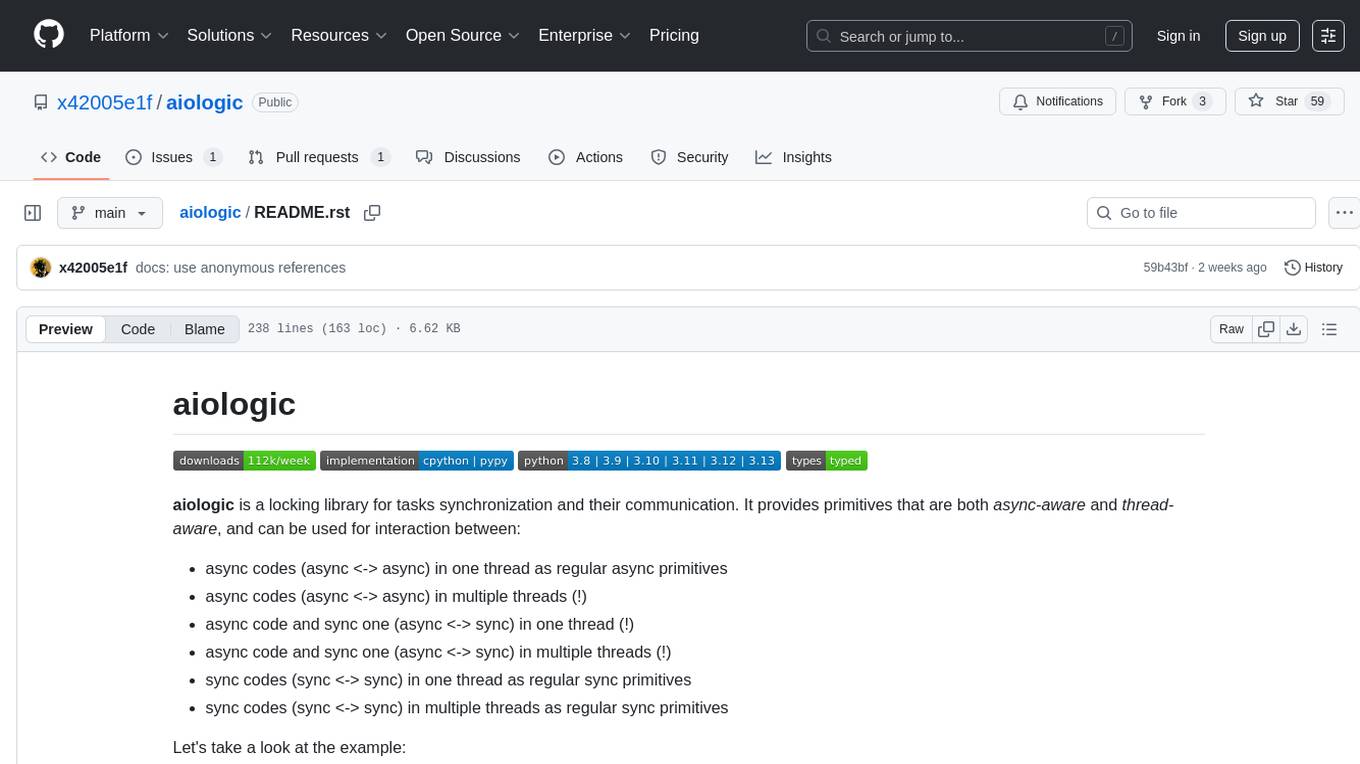
aiologic
aiologic is a locking library for tasks synchronization and their communication. It provides primitives that are both async-aware and thread-aware, and can be used for interaction between async codes (async <-> async) in one thread as regular async primitives, async codes (async <-> async) in multiple threads, async code and sync one (async <-> sync) in one thread, async code and sync one (async <-> sync) in multiple threads, sync codes (sync <-> sync) in one thread as regular sync primitives, sync codes (sync <-> sync) in multiple threads as regular sync primitives. It offers synchronization primitives like events, barriers, semaphores, capacity limiters, locks, readers-writer locks, condition variables, communication primitives like queues, non-blocking primitives like flags and resource guards, and supports various concurrency libraries like asyncio, curio, trio, anyio, eventlet, gevent, and threading. aiologic is implemented entirely on effectively atomic operations, providing incredible speedup on PyPy compared to alternatives from the threading module. It works in free-threaded mode and ensures atomic operations even with GIL.
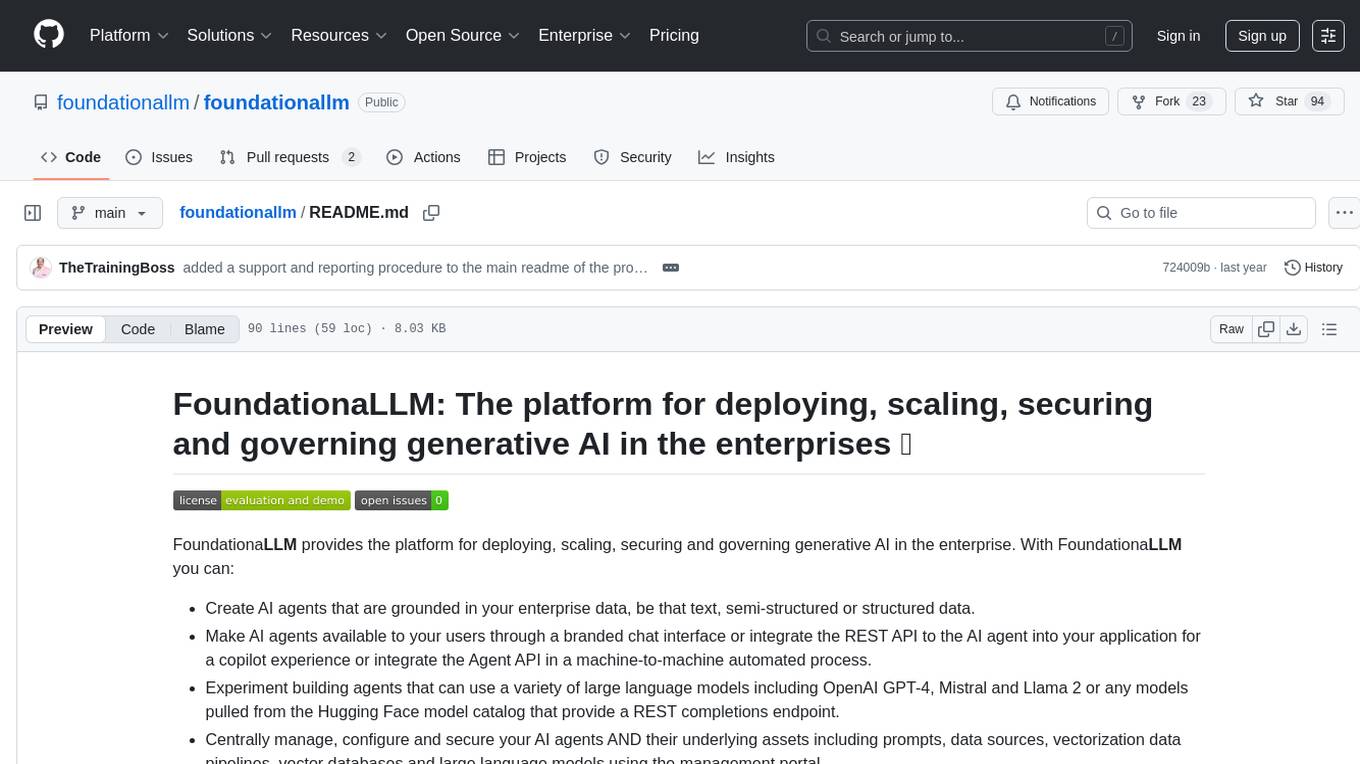
foundationallm
FoundationaLLM is a platform designed for deploying, scaling, securing, and governing generative AI in enterprises. It allows users to create AI agents grounded in enterprise data, integrate REST APIs, experiment with various large language models, centrally manage AI agents and their assets, deploy scalable vectorization data pipelines, enable non-developer users to create their own AI agents, control access with role-based access controls, and harness capabilities from Azure AI and Azure OpenAI. The platform simplifies integration with enterprise data sources, provides fine-grain security controls, scalability, extensibility, and addresses the challenges of delivering enterprise copilots or AI agents.
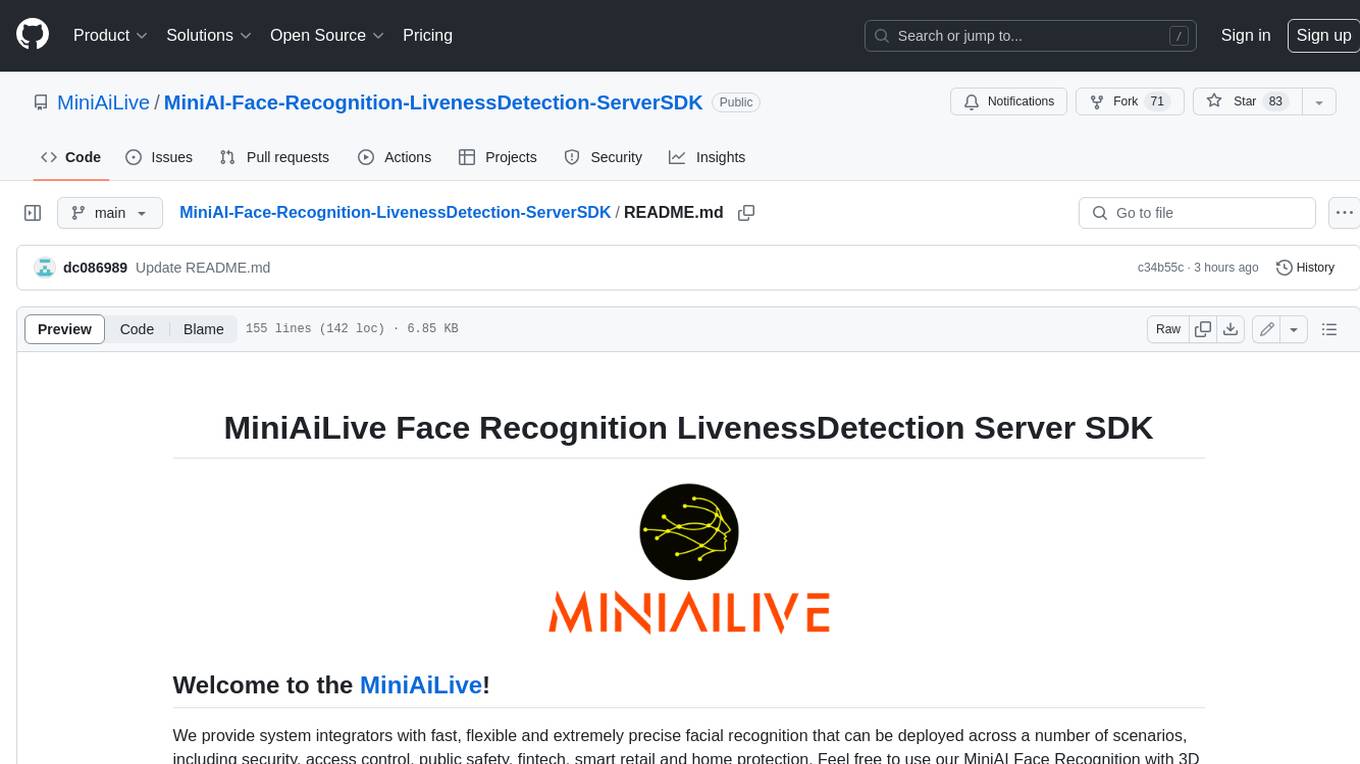
MiniAI-Face-Recognition-LivenessDetection-ServerSDK
The MiniAiLive Face Recognition LivenessDetection Server SDK provides system integrators with fast, flexible, and extremely precise facial recognition that can be deployed across various scenarios, including security, access control, public safety, fintech, smart retail, and home protection. The SDK is fully on-premise, meaning all processing happens on the hosting server, and no data leaves the server. The project structure includes bin, cpp, flask, model, python, test_image, and Dockerfile directories. To set up the project on Linux, download the repo, install system dependencies, and copy libraries into the system folder. For Windows, contact MiniAiLive via email. The C++ example involves replacing the license key in main.cpp, building the project, and running it. The Python example requires installing dependencies and running the project. The Python Flask example involves replacing the license key in app.py, installing dependencies, and running the project. The Docker Flask example includes building the docker image and running it. To request a license, contact MiniAiLive. Contributions to the project are welcome by following specific steps. An online demo is available at https://demo.miniai.live. Related products include MiniAI-Face-Recognition-LivenessDetection-AndroidSDK, MiniAI-Face-Recognition-LivenessDetection-iOS-SDK, MiniAI-Face-LivenessDetection-AndroidSDK, MiniAI-Face-LivenessDetection-iOS-SDK, MiniAI-Face-Matching-AndroidSDK, and MiniAI-Face-Matching-iOS-SDK. MiniAiLive is a leading AI solutions company specializing in computer vision and machine learning technologies.

ai_projects
This repository contains a collection of AI projects covering various areas of machine learning. Each project is accompanied by detailed articles on the associated blog sciblog. Projects range from introductory topics like Convolutional Neural Networks and Transfer Learning to advanced topics like Fraud Detection and Recommendation Systems. The repository also includes tutorials on data generation, distributed training, natural language processing, and time series forecasting. Additionally, it features visualization projects such as football match visualization using Datashader.
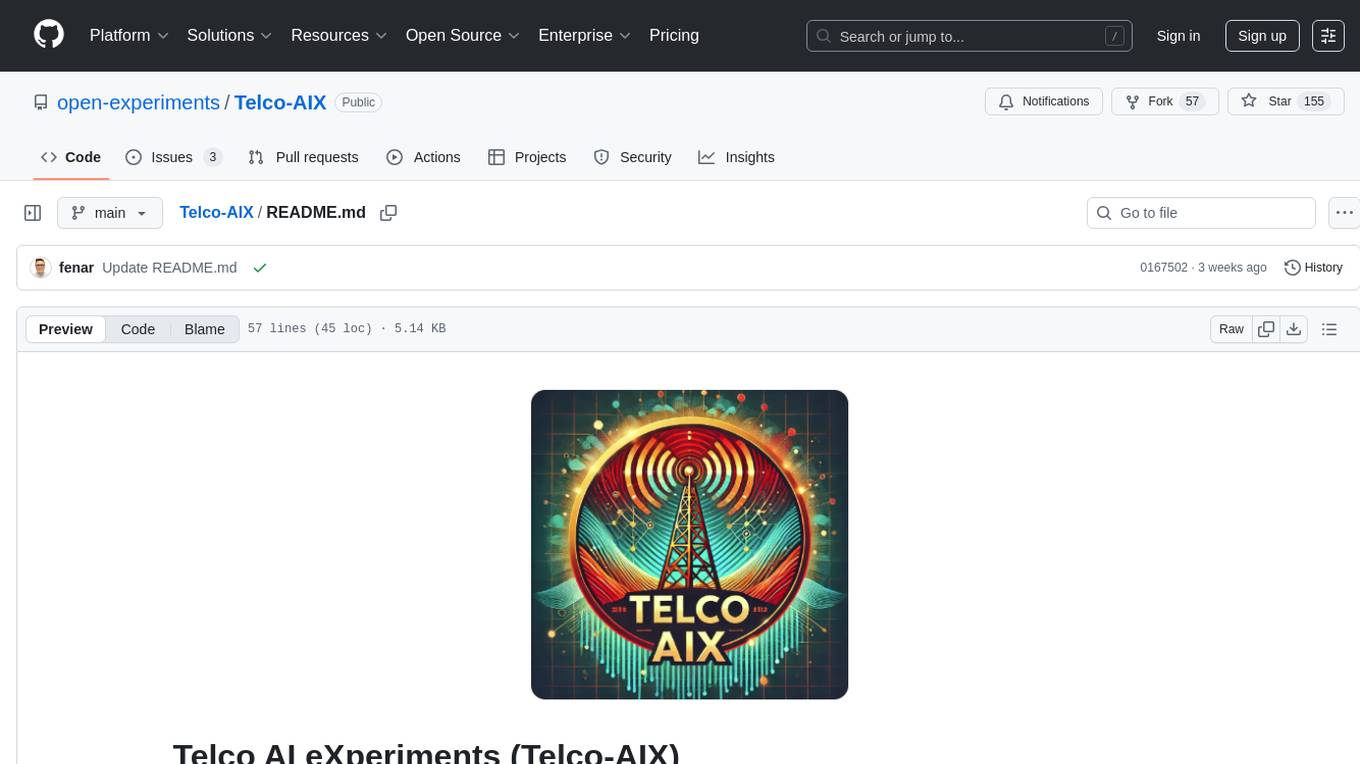
Telco-AIX
Telco-AIX is a collaborative experimental workspace focusing on data-driven decision-making through open-source AI capabilities and open datasets. It covers various domains such as revenue management, service quality, network operations, sustainability, security, smart infrastructure, IoT security, advanced AI, customer experience, anomaly detection, connectivity, network operations, IT management, and agentic Telco-AI. The repository provides models, datasets, and published works related to telecommunications AI applications.
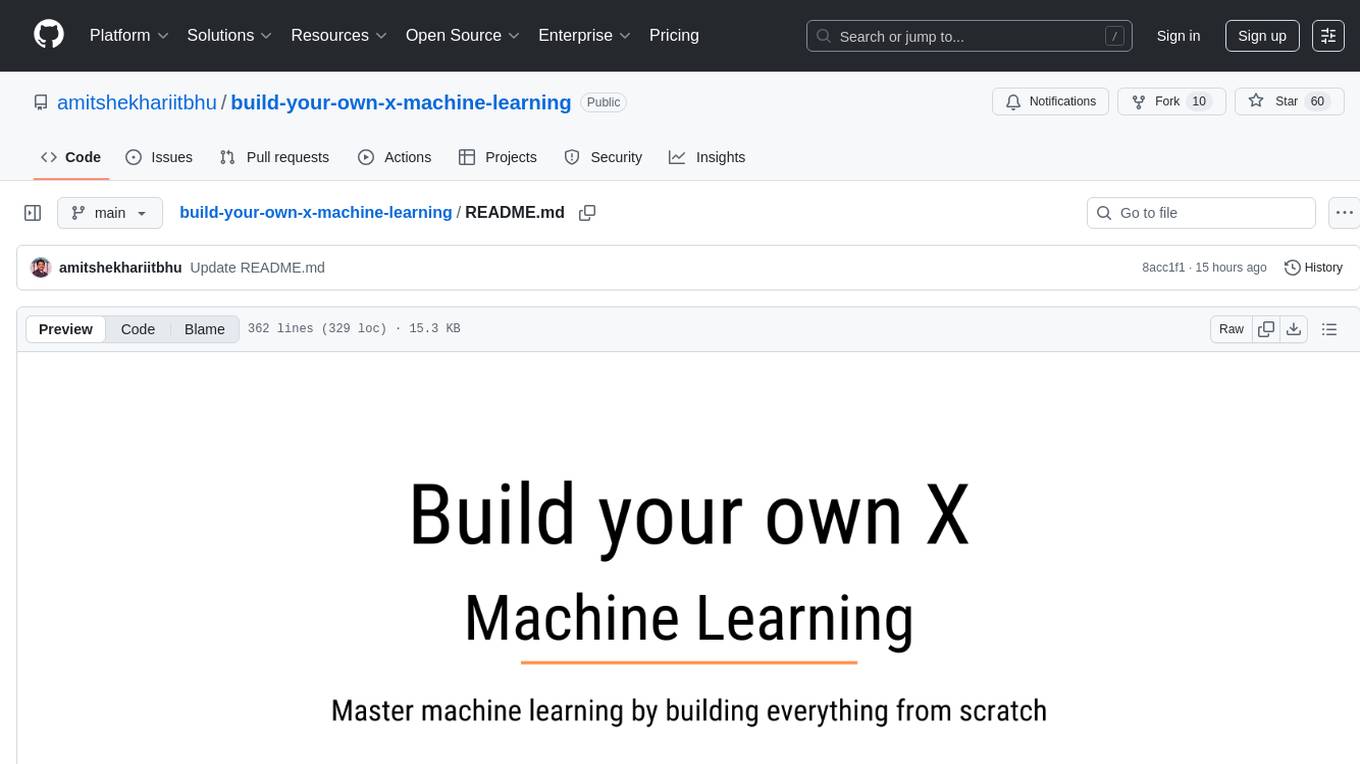
build-your-own-x-machine-learning
This repository provides a step-by-step guide for building your own machine learning models from scratch. It covers various machine learning algorithms and techniques, including linear regression, logistic regression, decision trees, and neural networks. The code examples are written in Python and include detailed explanations to help beginners understand the concepts behind machine learning. By following the tutorials in this repository, you can gain a deeper understanding of how machine learning works and develop your own models for different applications.
For similar jobs

MiniAI-Face-Recognition-LivenessDetection-AndroidSDK
MiniAiLive provides system integrators with fast, flexible and extremely precise facial recognition with 3D passive face liveness detection (face anti-spoofing) that can be deployed across a number of scenarios, including security, access control, public safety, fintech, smart retail and home protection.

MiniAI-Face-Recognition-LivenessDetection-ServerSDK
The MiniAiLive Face Recognition LivenessDetection Server SDK provides system integrators with fast, flexible, and extremely precise facial recognition that can be deployed across various scenarios, including security, access control, public safety, fintech, smart retail, and home protection. The SDK is fully on-premise, meaning all processing happens on the hosting server, and no data leaves the server. The project structure includes bin, cpp, flask, model, python, test_image, and Dockerfile directories. To set up the project on Linux, download the repo, install system dependencies, and copy libraries into the system folder. For Windows, contact MiniAiLive via email. The C++ example involves replacing the license key in main.cpp, building the project, and running it. The Python example requires installing dependencies and running the project. The Python Flask example involves replacing the license key in app.py, installing dependencies, and running the project. The Docker Flask example includes building the docker image and running it. To request a license, contact MiniAiLive. Contributions to the project are welcome by following specific steps. An online demo is available at https://demo.miniai.live. Related products include MiniAI-Face-Recognition-LivenessDetection-AndroidSDK, MiniAI-Face-Recognition-LivenessDetection-iOS-SDK, MiniAI-Face-LivenessDetection-AndroidSDK, MiniAI-Face-LivenessDetection-iOS-SDK, MiniAI-Face-Matching-AndroidSDK, and MiniAI-Face-Matching-iOS-SDK. MiniAiLive is a leading AI solutions company specializing in computer vision and machine learning technologies.

PyRIT
PyRIT is an open access automation framework designed to empower security professionals and ML engineers to red team foundation models and their applications. It automates AI Red Teaming tasks to allow operators to focus on more complicated and time-consuming tasks and can also identify security harms such as misuse (e.g., malware generation, jailbreaking), and privacy harms (e.g., identity theft). The goal is to allow researchers to have a baseline of how well their model and entire inference pipeline is doing against different harm categories and to be able to compare that baseline to future iterations of their model. This allows them to have empirical data on how well their model is doing today, and detect any degradation of performance based on future improvements.
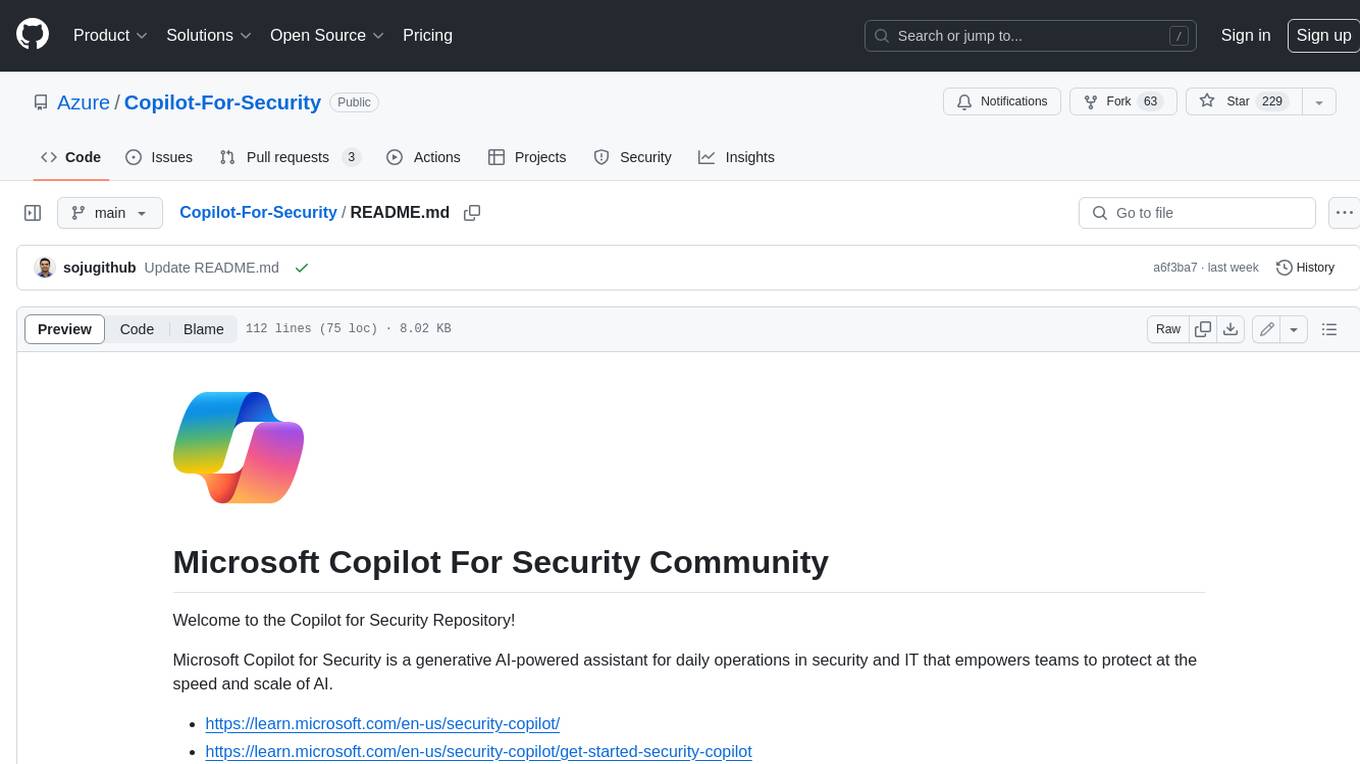
Copilot-For-Security
Microsoft Copilot for Security is a generative AI-powered assistant for daily operations in security and IT that empowers teams to protect at the speed and scale of AI.

tracecat
Tracecat is an open-source automation platform for security teams. It's designed to be simple but powerful, with a focus on AI features and a practitioner-obsessed UI/UX. Tracecat can be used to automate a variety of tasks, including phishing email investigation, evidence collection, and remediation plan generation.
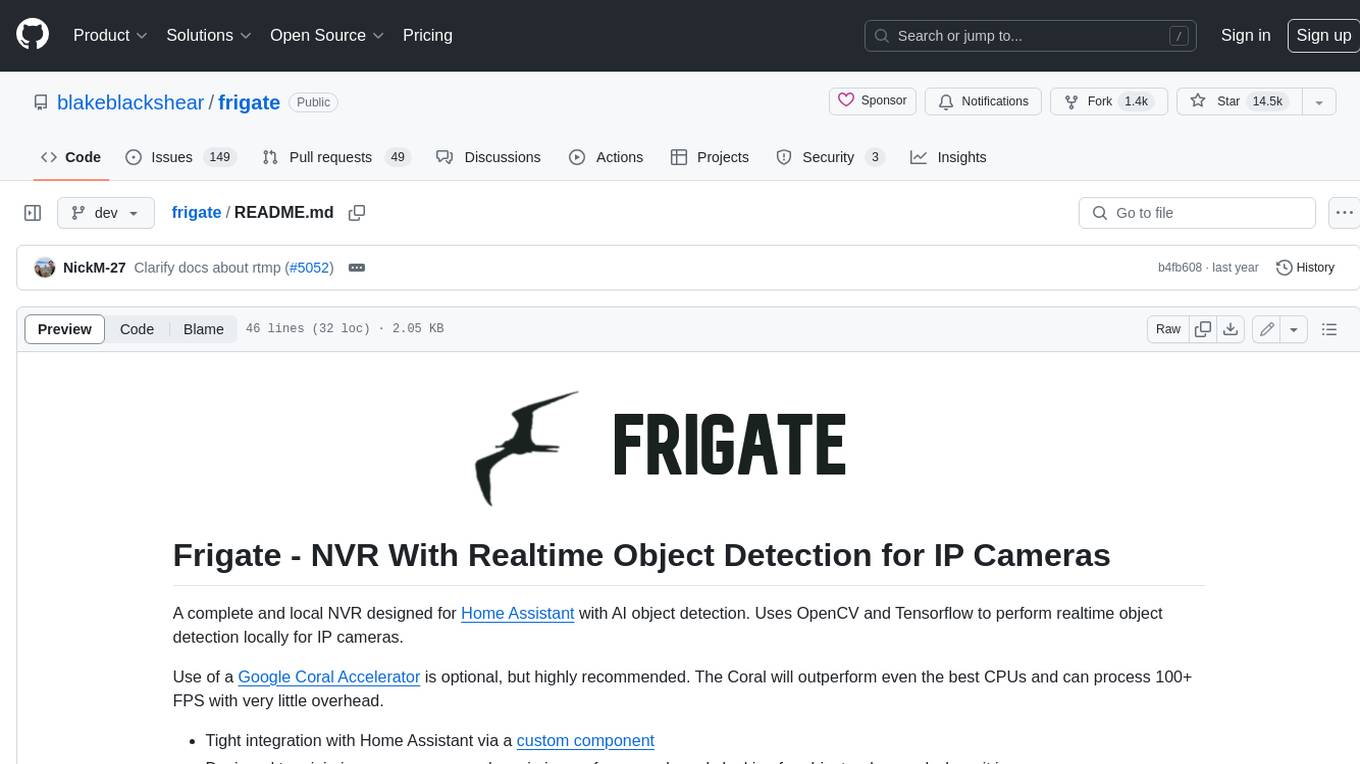
frigate
Frigate is a complete and local NVR designed for Home Assistant with AI object detection. It uses OpenCV and Tensorflow to perform realtime object detection locally for IP cameras. Use of a Google Coral Accelerator is optional, but highly recommended. The Coral will outperform even the best CPUs and can process 100+ FPS with very little overhead.

AIL-framework
AIL framework is a modular framework to analyze potential information leaks from unstructured data sources like pastes from Pastebin or similar services or unstructured data streams. AIL framework is flexible and can be extended to support other functionalities to mine or process sensitive information (e.g. data leak prevention).
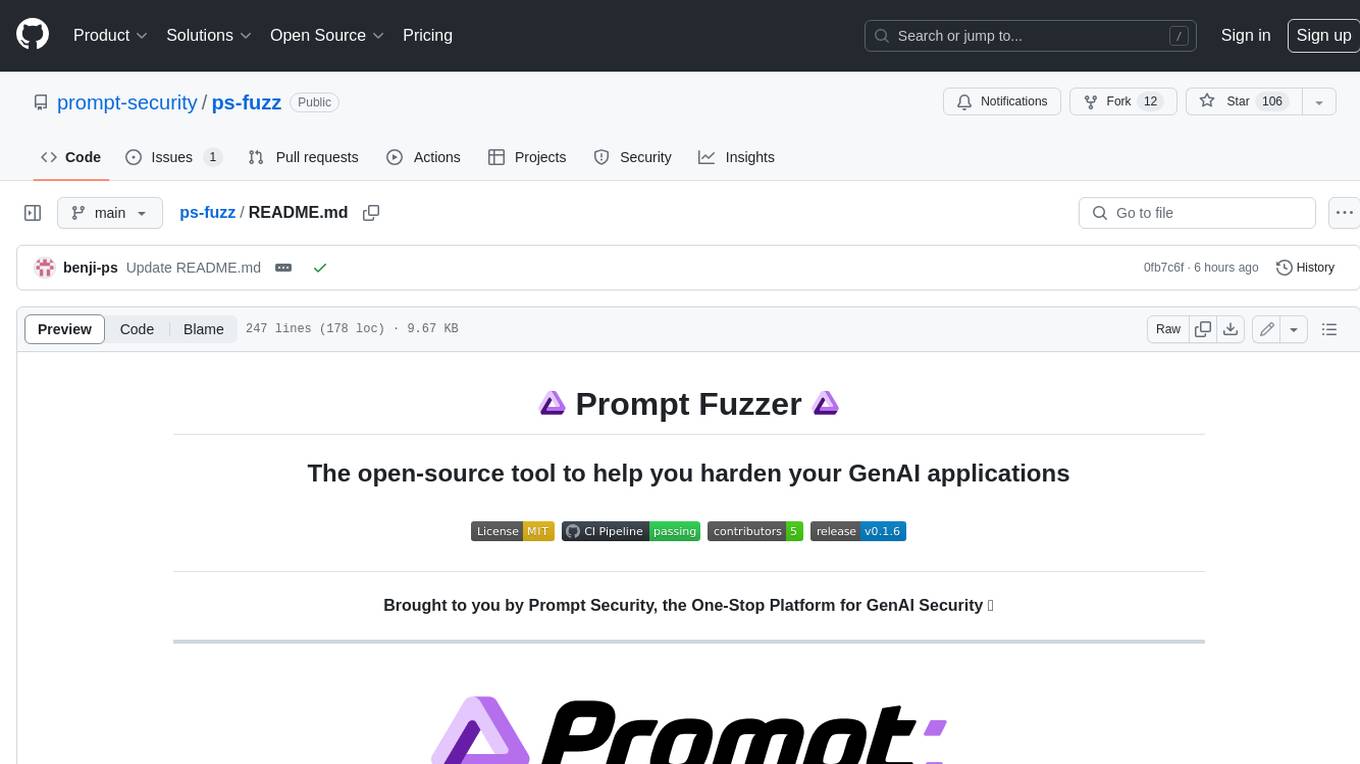
ps-fuzz
The Prompt Fuzzer is an open-source tool that helps you assess the security of your GenAI application's system prompt against various dynamic LLM-based attacks. It provides a security evaluation based on the outcome of these attack simulations, enabling you to strengthen your system prompt as needed. The Prompt Fuzzer dynamically tailors its tests to your application's unique configuration and domain. The Fuzzer also includes a Playground chat interface, giving you the chance to iteratively improve your system prompt, hardening it against a wide spectrum of generative AI attacks.



